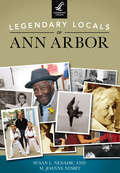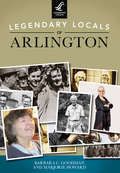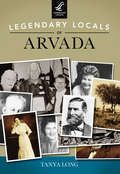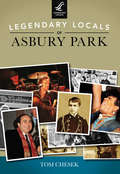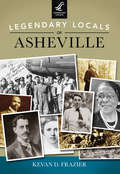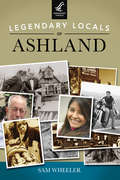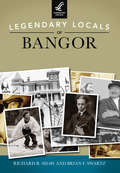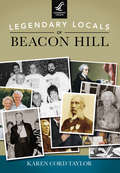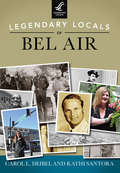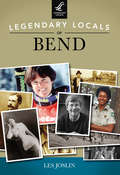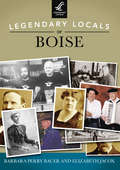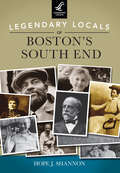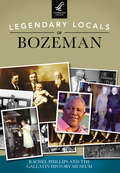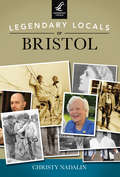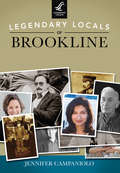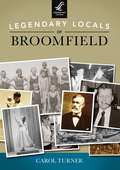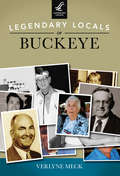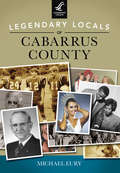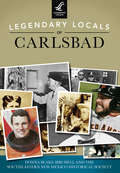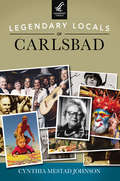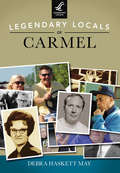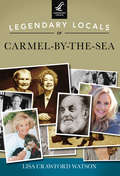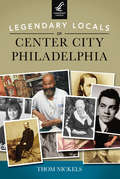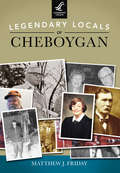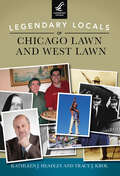- Table View
- List View
Legendary Locals of Ann Arbor (Legendary Locals)
by Susan L. NenadicGraced by the Huron River with an abundance of parks, Ann Arbor offers residents and visitors entertainment, sports, shopping, dining, and of course, the University of Michigan. Legendary Locals of Ann Arbor celebrates its citizens. Some of those who make up Ann Arbor are creative artists, inspiring educators, dedicated public servants, and determined business owners. With the exception of Lewis the cat, who reigned at Downtown Home and Garden, this book is filled with stories about people who have made and are making Ann Arbor one of the best places to live in the United States. Within its pages lie the stories of who chose maize and blue as the University of Michigan's colors; who was the first Ann Arborite to race in the Indy 500; and who sold Tom Monaghan, founder of Domino's, his first pizzeria. Inside are photographs and descriptions of the legendary people of the past and the present, as well as those who are on their way to becoming the legends of the future.
Legendary Locals of Arlington (Legendary Locals)
by Barbara C. GoodmanFrom its days as the site of a Revolutionary War battle to its modern-day appeal as a restaurant mecca, Arlington, at its heart, is a community of active citizens. Once agricultural, Arlington is now a cosmopolitan suburb and home to businesspeople, scientists, artists, and others who have been supported by their town and, in turn, have created an energetic community. Peg Spengler�s foresight helped shape town government while James McGough�s dream of a museum honoring local sculptor Cyrus Dallin came true. Dentist George Franklin Grant was the first African American on Harvard�s faculty and invented the golf tee; years later, Bob Frankston invented the spreadsheet. John Mirak, orphaned in the Armenian genocide, became a town benefactor while Howard Clery turned a family tragedy into a cause to help others. The Hurd and Greeley families have long served their community as public servants. Their stories make up Legendary Locals of Arlington, paying tribute to just some of the people who make this dynamic town their home.
Legendary Locals of Arvada
by Tanya LongUnique characters have always made up the landscape of Arvada. Pioneers, ranchers and farmers, business leaders, community-minded individuals, doctors, sports figures, and even a Broadway star have all called home the city on a bluff overlooking Clear Creek. Benjamin Wadsworth was not only one of Arvada's founding fathers but also the town's first postmaster, and he donated many parcels of land for schools and churches to be built in the burgeoning town. Lloyd King, in 1947, opened the first King Soopers grocery store in Arvada. From this one small market grew an empire of more than 100 King Soopers stores in Colorado. Popular radio personality Irv Brown is known as "Denver's go-to guy" for sports talk. Brown coached at Arvada High School during the 1960s, leading the Redskins to 10 conference football titles and one state championship. And two-time Cy Young Award-winner Roy Halladay honed his baseball skills in Arvada as a youth. The starting pitcher for the Philadelphia Phillies graduated from Arvada West High School in 1995. From Louis Ralston's discovery of gold in 1850 along the creek that bears his name, to the present day sprawling suburb, Arvada's people have helped make the town a jewel of the Centennial State.
Legendary Locals of Asbury Park
by Tom ChesekIt is a pious paradise wrested from the dunes; a salty carnival of dreamers, drifters, and just plain folks; a city made legendary by Bruce Springsteen and Stephen Crane but grounded in generations of turbulent American reality. Even those who never lived there feel proprietary about Asbury Park--a place of shared experiences and strong passions, where grand sandcastle plans wash up against changing times and tides. Legendary Locals of Asbury Park captures a parade of personalities, from the visionaries who challenged nature to the true believers who sought, against tremendous odds, to make a year-round life in this city of summers. The shopkeepers and show people, the advocates on the front lines of social change, and the chroniclers who witnessed history are all among those who helped a small town cast a giant profile, here and on the big boardwalk beyond.
Legendary Locals of Asheville (Legendary Locals)
by Kevan D. FrazierLike all great cities, Asheville's story is one of people, not institutions or industries. For more than two centuries, deep in the Appalachian Mountains of North Carolina, extraordinary women and men have created a truly unique American city. Legendary Locals of Asheville tells the stories of the people who founded, built, and rebuilt Asheville. From the first woman elected to state office in the South, who won her primary before women had the right to vote, to the grandson of a famed railroad magnate who built a 250-room chateau that became the largest home in America, to the entrepreneur who helped ignite the city's renaissance when he risked opening an art gallery downtown when most of it was still boarded up, Ashevillians are an amazing lot. Likewise, there are stories of extraordinary groups like the renowned faculty of an experimental college that redefined the American arts or the brave high school students who joined together to fight segregation. Their stories are as touching and fascinating as they are varied.
Legendary Locals of Ashland (Legendary Locals)
by Sam WheelerA century and a half of close-knitted community spirit, independent-mindedness, and a strong sense of stewardship have uniquely melded into present-day Ashland. Behind that patchwork of local ingenuity, artistry, and infamy are the faces of thousands--too many of whom are not mentioned within the pages of this book. There were hundreds of generations of Shasta Native American families that lived off the hills and creeks where Ashland now sprawls, but their abodes were abandoned and replaced by the lumber and flour mills, cleared streets, and painted homes of Ashland Mills. The sense of spirit and enthusiasm instilled by Ashland's early settlers bred the town's participation in the Chautauqua cultural movement, the remnants of which harbor Ashland's world-renown Oregon Shakespeare Festival, which paved the way for a former mill town's future prosperity. That spirit of ingenuity and artistry continues to shape Ashland and attracts hundreds of thousands of visitors annually to the quaint town nestled below the mighty crest of Siskiyou Pass along the Oregon-California border.
Legendary Locals of Bangor
by Richard R. Shaw Brian F. SwartzSince its settlement in 1769, Bangor's greatest resource has been its people. Long before 1834, when the town on the Penobscot became a city, future legends were born who transformed it into a world-class community. Hannibal Hamlin served as Abraham Lincoln's first vice president. Timber tycoon Sam Hersey financed urban development while less affluent folk such as Molly Molasses also made their mark. When philanthropists Stephen and Tabitha King are not writing best-selling novels, they are spreading their wealth throughout the community. Bangor's melting pot includes the Italian Baldacci family and the Jewish baker Reuben Cohen, who, with his wife Clara, raised their son Bill, a US senator and defense secretary. More infamous but equally legendary is brothel keeper Fanny Jones. Paul Bunyan earned a statue on Main Street. Airport troop greeters Kay Lebowitz and Bill Knight round out the list of notables. They are all jewels in Bangor's crown, and each in their own way is a bona fide legend.
Legendary Locals of Beacon Hill (Legendary Locals)
by Karen Cord TaylorIn the 1600s, William Blaxton set up his farmstead on Beacon Hill because it was far from the bustle of the city. John Hancock's uncle Thomas Hancock built his mansion on the hill in the 1700s so he could enjoy a rural lifestyle. In the early 1800s, future mayor of Boston Harrison Gray Otis moved to Beacon Hill because it was the new and fashionable neighborhood he was helping create. Louisa May Alcott, in the 19th century, and Robert Frost, in the 20th, lived on the hill because the literary set loved the neighborhood's picturesque streets and close quarters that made it easy to get together for conversation. The 9,000 residents who live in this small, urban neighborhood of Boston today appreciate its walkability, convenience, quirkiness, and neighborliness. The historic architecture, ever-burning gas lamps, rugged bricks, and one-of-a-kind shops prove that the best of the past can live comfortably with the novelty of the present.
Legendary Locals of Bel Air (Legendary Locals)
by Carol L. DeibelResidents of Bel Air, a small county seat located in northern Maryland, played inordinately large roles in the evolution of the state and nation. Bel Air boasts two Maryland governors, William Paca and Augustus Bradford; the fi rst woman elected to the Maryland State Senate, Mary Risteau; as well as Milton Reckord, whose 65-year military career is unequaled. Other local legends include radio personality Diane Lyn, artist Jim Butcher, and Kimmie Meissner, the youngest member of the 2006 US Olympic team. There are villains as well. The civil rights era brought the mysterious 1970 explosion that rocked the town on the eve of H. Rap Brown's scheduled trial in the Bel Air Courthouse. Peruse the pages of Legendary Locals of Bel Air and fi nd generations of talented and passionate people who turned a wilderness town into a thriving suburban center that still manages to maintain its unique beauty and sense of community.
Legendary Locals of Bend (Legendary Locals)
by Hays County Historical Commission Les JoslinA fascinating mix of local legends who could be characterized as "the right people, in the right place, at the right time" arrived in Central Oregon during the past century and a half to make Bend the fascinating city it has become. Some of these people--explorer John Charles Fremont, publisher George Palmer Putnam, economist William A. Niskanen, and "World's Greatest Athlete" Ashton Eaton among them--gained national prominence and even global stature. Others were and are more ordinary people who have done and continue to do extraordinary things in an extraordinary place, a small but singular city of some 80,000 souls astride the Deschutes River at the eastern foot of the Cascade Range.
Legendary Locals of Boise (Legendary Locals)
by Barbara Perry Bauer Elizabeth JacoxBoise of the 21st century is very different from the tiny community established in 1863 at the crossroads of the Oregon Trail and the road to the Boise Basin gold mines. Originally known as "Boise City," it existed as a distribution center for supplies and fresh food for miners. The development of irrigated agriculture and the expansion of transportation networks during the 20th century and an influx of pioneers from many regions of the United States helped the city grow into a technology center during the 21st century. Early residents like Tom and Julia Davis helped create a city filled with green parks and walking paths; author and illustrator Mary Hallock Foote brought Boise to the attention of the nation with her writing and illustrations; businessmen J.R. Simplot and Joe Albertson established local businesses that grew to national companies. The music of Curtis Stigers, the literature of Anthony Doerr, and the athletic prowess of Kristin Armstrong have helped focus attention on Boise, which is now recognized as one of the country's most livable communities.
Legendary Locals of Boston's South End (Legendary Locals)
by Hope J. ShannonFrom the South End's early years as an upper- and middle-class residential district to its time as an immigrant and rooming house neighborhood and then to its recent urban renewal, residents have shaped its legacy and its place within the city of Boston. Locals have worked in common to make the South End a safe and vibrant community for over two centuries. Notables such as architect Gridley J.F. Bryant, preservation advocate Arthur Howe, and pedestrian advocate Ann Hershfang contributed immensely to the built environment. Residents like settlement house leader Robert Woods, immigrant and author Mary Antin, politician and activist Mel King, urban gardener Betsy Johnson, and lawyer Harry Dow, to name a few, shaped minds and lives alike. Add to their ranks artists like Allan Rohan Crite and Kahlil Gibran, jazz club owner Joseph Walcott, longtime restaurateurs such as the Foley and Manjourides families, and bar owner and gay rights advocate Leo Motsis and a true picture of the South End's history and diversity begins to emerge.
Legendary Locals of Bozeman (Legendary Locals)
by Rachel PhillipsFrom its inception as a supply town during Montana's gold rush in the 1860s, Bozeman has attracted visionaries, leaders, and pioneering thinkers. Bozeman's first mayor, John V. Bogert, established a precedent for keeping the city clean, safe, and orderly. City commissioner and tireless worker Mary Vant Hull spearheaded efforts to build a new library and to expand local parks and trails, and early physician Dr. Henry Foster successfully performed one of the first caesarean sections in Montana. Incredibly talented outdoor advocates and athletes like mountain climber Alex Lowe and long-distance runner Ed Anacker have complemented Bozeman's outdoor lifestyle. An emphasis on art, music, and culture began in the 1860s with piano and voice sensation Emma Weeks Willson. Today, artist Jim Dolan's sculptures are enjoyed all over town, and illusionist Jay Owenhouse wows children and adults with his live shows. Inspiring individuals like Cody Dieruf, who passed away from cystic fibrosis at the age of 23, and dedicated streetcar driver Larry O'Brien have added kindness and courage to local life.
Legendary Locals of Bristol
by Christy NadalinThe story of Bristol is the story of America, played out on the small stage of a lobster claw-shaped peninsula at the heart of Narragansett Bay. From the massacre and displacement of the first Americans to the rise of the merchant class; exploration; slavery; war and peace; the Industrial Revolution; waves of immigration--all these wildly disparate facets of the American experience have been represented and reflected within these 20 square miles. Bristol has been home to patriots and pirates; ministers and murderers; captains who dominated at the helms of whalers, battleships, and 12-meter sailboats; larger-than-life industrialists; Hollywood and Broadway royalty; artists, writers, musicians, and culinary visionaries. But the bulk of the threads in Bristol's remarkable tapestry are not bold-colored silk, bright metallic, or rich cashmere--most are simple and natural, unremarkably structured and hued, but each one quietly doing its part to form the strong, tightly-woven foundation of this very special place.
Legendary Locals of Brookline (Legendary Locals)
by Jennifer CampanioloFor its first 75 years, Brookline was a bucolic area of Boston, with rolling hills and low-lying salt marshes. Named �Muddy River� by its residents after a shallow tidal estuary bordering Roxbury, Brookline had no more than 50 families inhabiting it when it was incorporated as an independent town on November 13, 1705. Long regarded as a liberal, progressive community, Brookline is a model of how an effective town government can positively impact the life of its citizens. Brookline boasts numerous Nobel Prize winners�doctors, scientists, and researchers who have made enormous strides in their fields. Brookline shares Boston�s strong literary tradition, with residents like poet Amy Lowell and mystery writer Dennis Lehane. Brookline�s pedestrian-friendly infrastructure, with many residents who eschew cars and shop locally, attracts many small-business owners such as Dana Brigham and Seth Barrett. Brookline has been home to a number of sports luminaries like Larry Bird, Terry Francona, and Robert Kraft. Famous politicians include the 35th president, John F. Kennedy, who was born in Brookline; former governor Michael Dukakis; and New York mayor Michael Bloomberg. Legendary Locals of Brookline tells their stories, as well as the stories of some of the lesser-known heroes and humanitarians who make Brookline a great place to call home.
Legendary Locals of Broomfield
by Carol TurnerThe city of Broomfield had its beginnings in the "howling wilderness" of the late 1850s. At first, the settlement was little more than two stage stops along a treacherous route to California. The Church family operated Church's Crossing Stage Stop, a day's ride from Denver on the Overland Trail. Over many years, other pioneer families settled in: the Graves and Crooks families, the Browns, Nissens, Wrights, Koziseks, Archers, Hansens, Shaws, Brunners, and more. Some of these families claim five or six generations in the area. A century passed before Broomfield began to grow into the city it is today. In the late 1950s, a group of investors began building Broomfield Heights. As young families began moving in, the farm community was transformed into a suburban city, guided by local notables such as Don DesCombes, George Di Ciero, and others. Perhaps the most admirable aspect of the city's history is the enormous amount of work done by community-minded volunteers. Their story is one of selfless enthusiasm, of hard work with no reward except a better place to live.
Legendary Locals of Buckeye
by Verlyne MeckIn 1884, Malie Monroe Jackson began and named a canal Buckeye in honor of his native state, Ohio, the Buckeye state. In 1886, Thomas Newton Clanton added 10 miles to the canal. The following year, he applied for a post office, and on March 10, 1888, the post office, named Buckeye, was established. Clanton platted a townsite and named the town Sidney, though why he chose that name remains a mystery. Beginning in 1910, advances in transportation put the community on the map, and Sidney became Buckeye. Hugh Watson, founder of the Buckeye Valley Bank, became the town's first mayor in 1929. On January 1, 2014, Buckeye became the newest city in Arizona. This newest volume also celebrates today's Buckeye settlers, such as Levi Beard, Tony Youngker, Clemie Arnold, and Bob Doster, DVM, updating Buckeye's colorful history of notable residents.
Legendary Locals of Cabarrus County
by Michael EuryIn calling for the region's separation from Mecklenburg County in 1792, John "Pioneer Paul" Barringer set a high-spirited standard for future legendary locals of the nascent Cabarrus County. New communities flourished on the former homesteads of Robert Harris and Paul M. Dayvault, and the county was subsequently transformed by devoted civic leaders such as John Washington Carriker, Jonas Cook, A.L. Brown, J. Carlyle Rutledge, Martha Melvin, and Allen T. and Ella Mae Small. Cabarrus County citizens, like Glenn McDuffie, the famous "kissing soldier" of World War II; Corine Cannon, the first African American woman to work in the textile mills; and Margaret Hagerty, the Guinness World Records-holding senior citizen marathon runner, often tread where others recoil. Kannapolis-born Ralph Earnhardt started a racing dynasty here, while other natives found their fortunes elsewhere, including record producer Marshall Sehorn, NFL superstar Natrone Means, and broadcaster Beth Troutman. Cabarrus County's people have always been its most valuable resource, and their inspirational and exhilarating stories are collected in this keepsake edition.
Legendary Locals of Carlsbad
by Donna Blake Birchell Southeastern New Mexico Historical SocietyBorn from opportunity and a promotional scheme hatched by founding father Charles B. Eddy, Carlsbad started life as a tent city on a desolate landscape. As the investment money started to flow, the Pecos River was harnessed through the creation of irrigation, which turned the region into a rich, fertile valley. As tuberculosis swept the nation, hundreds of new settlers arrived in Carlsbad for the arid climate. Legendary Locals of Carlsbad celebrates their descendants who forged the community of today. Learn about socialite Cesarine Graves, daredevil and "Mr. Welcome" Frank Kindel, actors Dan Blocker and Bruce Cabot, drag racer Dick Harrell, newscaster Linda Wertheimer, astronaut F. Drew Gaffney, and baseball star Cody Ross, to name but a few. Included also are the tales of the trials and heroism shown and faced by all the veterans of wars that Carlsbad provided, especially the World War II veterans of the Bataan Death March, the Vietnam War, and the wars in Iraq and Afghanistan.
Legendary Locals of Carlsbad (Legendary Locals)
by Cynthia Mestad JohnsonA collision of cultures in a seaside resort community, Carlsbad sits on a seven-mile stretch of white-sands beach idyllically located on the Pacific coast of north county San Diego. The idea of Carlsbad began in the late 1880s when two small groups of entrepreneurs ascended, simultaneously, from both the north and the south. The first group discovered natural mineral springs, which they promoted to tourists as having healing powers. As a result, the town became a very popular resting point for the rich and famous when traveling by train from Los Angeles to the famed Del Mar horse races. Subsequently, the Mexican Revolution began to the south and drove a second group of visionaries to Carlsbad. Thus, the quaint downtown area, known as the Village, was created along with a vibrant Barrio. Incorporated in 1952, Carlsbad remains, today, a tight-knit community of multigenerational and uniquely talented locals.
Legendary Locals of Carmel (Legendary Locals)
by Debra Haskett MayEarly Carmel settlers Silas Moffitt and William Kinzer found the area to be abundant for hunting and the soil rich for farming. Quaker in origin, the town's quest for importance in education was forefront and remains so today. With other dedicated leaders through a time of rapid growth in the mid-20th century, Robert Hartman and Dale Graham set the standard to make Carmel High School a respected rival in academic, sports, and extracurricular competitions. Beautiful art galleries, anchored by the Evan Lurie Building, dot the rejuvenated downtown Arts & Design District where Colonel Trester's blacksmith shop and O.W. Nutt's hardware store once stood. A far cry from tented summer church revivals, world-class musicians and performers now take the stage of the Palladium, an acoustically perfect and visually magnificent performing arts center. Visionary mayor James Brainard seeks a sixth term and hopes to continue on the same path of growth and renewal. The city has been voted one of America's best places to live, and Carmel's varied and colorful residents have been proving this since the 1830s.
Legendary Locals of Carmel-by-the-Sea
by Lisa Crawford WatsonA place whose history has long been a source of fable and fascination, Carmel-by-the-Sea is a community whose ancestors summered by the sea and ultimately stayed through the seasons. After founders Frank Powers and Frank Devendorf populated the once-barren potato patches with artists and academicians, it became a place defined as much by legends and landscape as by the characters who came to Carmel. Whether it is the clear light that attracted photographers Edward Weston, Ansel Adams, Doug Steakley, and Bob Kolbrener; the whisper in the trees, the rhythm of the waves, and the stillness at dawn that seduced writers Mary Austin, Robinson Jeffers, Jack London, Bob Campbell, Rick Masten, and Jane Smiley; or the unbridled beauty in a majestic mountain, surging sea, or verdant valley that drew in artists Mary DeNeale Morgan, William F. Ritschel, E. Charlton Fortune, Mari Kloeppel, Carol Chapman, and Loet Vanderveen, the truth is that Carmel-by-the-Sea gets in one's soul and makes its home there.
Legendary Locals of Center City Philadelphia (Legendary Locals)
by Thom NickelsPhiladelphia is a hard mistress when it comes to honoring native talent, and the city has more than its fair share of notable figures. Consider colorful politicians like Frank Rizzo and Richardson Dilworth, international celebrities like Grace Kelly, sports legends like Connie Mack, Philadelphia Museum of Art icons like Anne d'Harnoncourt, or national radio personalities like Terry Gross. Business tycoons such as John Wanamaker and Russell Conwell, founder of Temple University, made many contributions to the city. Pearl Buck, author of The Good Earth, and Christopher Morley, America's G.K. Chesterton, created legacies of their own. Other legends like the nearly forgotten Agnes Repplier, a world-famous essayist and contemporary of Henry James, and poet Daniel Hoffman, the designated US poet laureate in 1973-1974, have helped enrich the city's literary reputation. There are Marian Anderson, Mario Lanza, and Hollywood actor Kevin Bacon, whose fame is equaled by his city planner father, Edmund. Architects like Frank Furness, Louis Kahn, and Vincent Kling helped transform the city into an international destination. And there are many notables looming outside the margins of this book, waiting for their day of discovery.
Legendary Locals of Cheboygan
by Matthew J. FridayFounded as a lumbering town in the mid-1800s, Cheboygan has transformed over the years to be something much less simplistic and much more dynamic; so, too, have its people. While some of Cheboygan's residents played important roles in business or commerce, others made their mark through philanthropic work, service to the community, or just by their demeanor. History is as much about people as it is about events--people like Gordon "Scoop" Turner, who came to Cheboygan for a few months but ended up staying for a lifetime. There are businessmen like Millard D. Olds, who became one of the most successful lumbermen at a time when others were leaving town, and George M. Humphrey, the 55th treasurer of the United States. An eye towards the community has also made some residents legendary, such as Joyce and Quincy Leslie. And, of course, there are those whose history is shrouded in controversy, including Sheriff Fred Ming, under whose authority a Native American village was burned to the ground. Whatever their story, these locals have contributed to the character and history of Cheboygan.
Legendary Locals of Chicago Lawn and West Lawn (Legendary Locals)
by Kathleen J. HeadleyFrom West Palm Beach's beginnings as service town to Palm Beach, Standard Oil tycoon Henry Morrison Flagler's resort village, the city has evolved into a trendy art, cultural, and shopping mecca. Palm Beach County's largest city serves as county seat and center of business, government, and commerce. Taming America's last frontier saw the industriousness of pioneers and settlers such as Marion Gruber, the Potter brothers, George Lainhart, and Max Greenberg guide the "Cottage City" of yesteryear to today's gleaming metropolis. Meet many of West Palm Beach's pioneers, civic leaders, educators, business leaders, and entrepreneurs. Learn about the heroes, celebrities, philanthropists, and even the villains who have contributed to the mosaic of West Palm Beach.
